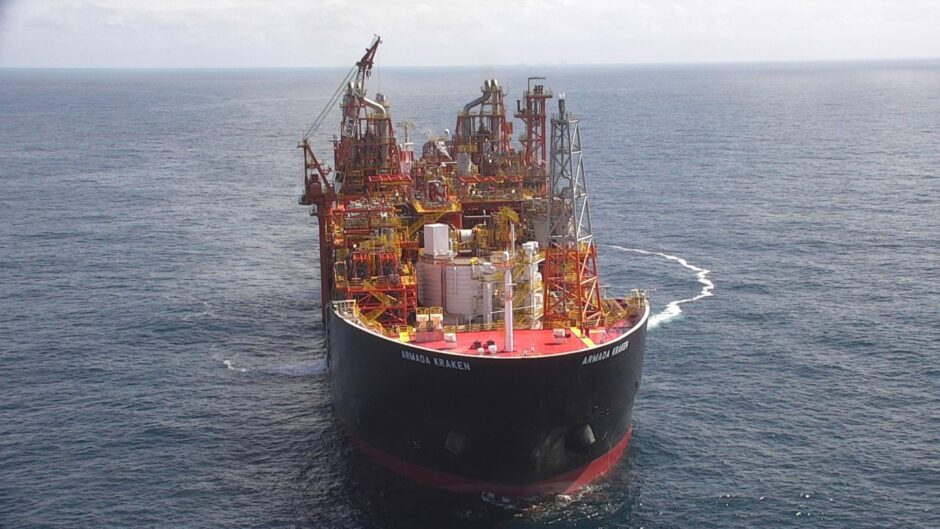
EnQuest (LON: ENQ) has cited the UK Government windfall tax for driving it to a loss in its 2022 financial results and leaving its Kraken field “to natural decline”.
The North Sea operator, which posted after-tax profits of $377m in 2021, reported a post-tax loss of $41.2m last year.
That was “primarily driven” by recognition of a $178.3m tax liability associated with the levy.
The firm shed further light on its decision to delay development of its Kraken field.
The investment incentive linked to the windfall tax has had an “indirect contribution to underlying inflationary pressures”, it said.
As a result, EnQuest has decided not to go after a 33 million barrel resource.
The 35% Energy Profits Levy (EPL) has a 91% return rate on new investment until the tax’ sunset in 2028.
But EnQuest has suggested this incentivisation “of industry-wide investment within a defined timeline” has actually increased costs of development and caused it to delay spending.
EnQuest said: “In light of the direct impact of the EPL on the Group’s available cash flow and the indirect contribution to underlying inflationary pressures through incentivisation of industry-wide investment within a defined timeline, the Group has delayed its plans to progress the Kraken drilling programme.
“With c.33 Mmboe of 2C resources, there remains significant opportunity in terms of main field side-track drilling opportunities, along with further drilling within the Pembroke and Maureen sands, but the Group has delayed the decision to sanction investment until 2024 at the earliest.
“As such, Kraken production will be subject to natural decline in the coming years.”
Meanwhile, trade body Offshore Energies UK has already warned that the windfall tax has dramatically cut firms’ borrowing powers through reserves-based lending.
EnQuest said, in a H1 2023 review, it has seen “a reduction of the available RBL capacity and liquidity available” due to the EPL.
It also noted that the windfall tax, going forward, has implications for its strategy as it “limits cash available for further deleveraging, capital investment and shareholder returns”.
EnQuest still has “strategic advantage” in the UK North Sea despite windfall tax
However, EnQuest did note that its “significant tax loss position” of $2.49bn – on which it can claim rebates – “provides EnQuest with a strategic advantage in the UK North Sea, enhancing the relative value of assets in EnQuest’s hands when compared to other tax paying participants”.
Pre-tax profits totalled $203m, down from $352.4m, on revenues of $1.85bn, up from 2021’s $1.265bn.
Net debt, as of the end of February this year, was down to $624.3m.
2022 milestones
Production increased 6.4% through the year to 47,259 barrels of oil equivalent per day, primarily driven by a full-year’s production from the Golden Eagle asset (having bought Suncor’s stake in 2021).
It also increased on improved perdormancesfrom assets including Magnus in the North Sea and PM8/ Seligi in Malaysia.
While production from Golden Eagle was “below expectations”, it still contributed strongly and had “fully paid back the initial acquisition costs” by the end of 2022.
In decommissioniong, EnQuest hailed the successful execution of a 24-well plugging and abandonment programme at the Heather and Thistle fields.
It has also developed “three credible and scalable” new energy and decarbonisation opportunities at the Sullom Voe Terminal in Shetland.
It has applied for two carbon capture and storage (CCS) licences from the industry regulator’s licensing round.
EnQuest is also assessing onshore wind and a new power solution for SVT, and exploring green hydrogen via wind around Shetland, with the ambition of producing around one million tonnes annually.
The company also said it is in discussions with West of Shetland oil and gas field owners to help facilitate electrification of their assets.
CEO Amjad Bseisu said: “Throughout 2023, we will remain focused on driving performance in our Upstream and Decommissioning businesses while pursuing our decarbonisation and new energy opportunities in a capital-light manner. We also intend to pursue balanced and disciplined capital allocation that will include shareholder returns in the near future.
“With our differentiated business model and the resilience, creativity and adaptability of our people, we are well positioned to deliver on our plans for the future.”
Recommended for you

